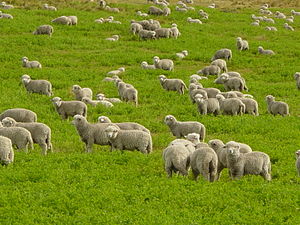Poetry often conveys images, emotions and ideas better than prose.
Although poetry is scattered throughout the Bible, the most-read poems are probably found in Psalms. And perhaps the best-known is Psalm 23.
We won’t begin to plumb the depth of this psalm but let’s take a look at it to learn how meaning comes through form:
The Lord is my shepherd, I lack nothing.
He makes me lie down in green pastures,
he leads me beside quiet waters,
he refreshes my soul.
He guides me along the right paths
for his name’s sake.Even though I walk
through the darkest valley,
I will fear no evil, for you are with me;
your rod and your staff,
they comfort me.You prepare a table before me
in the presence of my enemies.
You anoint my head with oil;
my cup overflows.
Surely your goodness and love will follow me
all the days of my life,
and I will dwell in the house
of the Lord forever. Psalm 23 (NIV)
In the first stanza, the psalmist is writing about the Lord. Notice the pronouns: I, he, my, me, his. There is some distance implied here. The psalmist is talking about the Lord’s work.
In the second and third stanza, the distance dissolves. Notice the pronounce now: I, you, me, your. Now we see more intimacy. The psalmist is talking to the Lord, not about him.
The opening stanza centers on pastoral imagery: shepherd, green pastures, quiet waters, paths.
At the center of the Psalm is this statement: “I will fear no evil for you are with me.”
That statement summarizes the meaning of the Psalm and also serves as a hinge. Where the first part of the psalm dealt with the sheep/meadow images, the last part moves to a hospitality imagery.
In the third stanza, the psalmist talks about a table, anointing with oil (an act of hospitality in that day), an overflowing cup which would be another act of hospitality.
And the psalm closes with the image of dwelling in the house of the Lord forever, hospitality at its ultimate: inviting someone to not only come for dinner but to move in permanently. A guest couldn’t ask for more.
The first stanza describes how the needs and wants of a sheep are provided. The last stanza describes how the needs and wants of a guest are provided.
Through form such as repetition, imagery, word choices, the psalmist’s meaning comes through: I’m well taken care of. The Lord protects me. The Lord protects and provides security that endures.
Form created vivid meaning.
We’ll continue next Friday.

